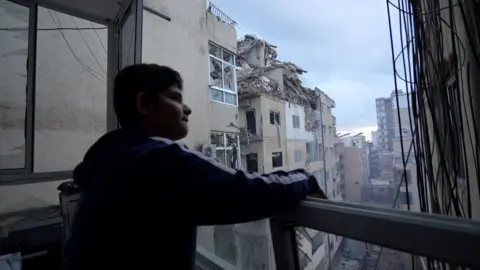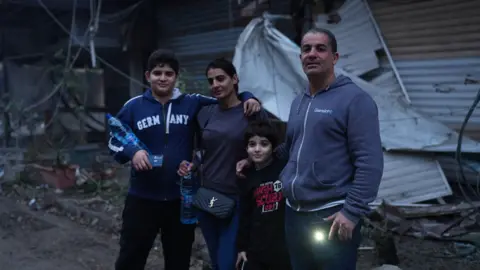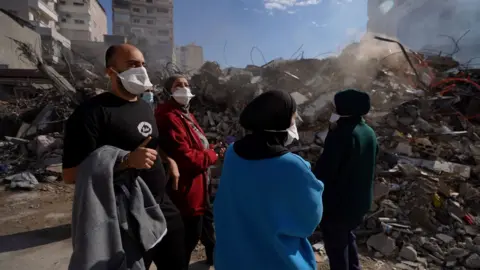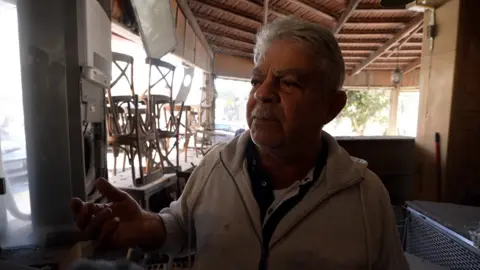Families return to destruction in southern Lebanon
 BBC
BBCThe family of four stood in the middle of the street in front of the pile of twisted metal and broken concrete, struggling to comprehend the devastation they were seeing.
The building had been destroyed by a recent Israeli air strike and smoke was still rising from the rubble. The next building to the right had partially collapsed; the one behind it had a huge hole at the top.
They continued walking to the building where they used to live, in Tyre in southern Lebanon. The displaced family was back, hours after a ceasefire between Israel and Hezbollah had come into effect. Nobody seemed to have stayed in their home.
As there was no electricity they took the stairs to the sixth floor, helped by the torches on their phones.
Mohamad Marouf led his wife and two sons. He struggled to open the main door. When he finally got in, he instantly realised that his home as he knew it was, for now, gone.
“I’m so sad, it’s a nice and decent house,” said Mr Marouf, a car dealer. “There’s just so much damage.”
Panels had fallen from the ceiling. Windows, doors and furniture were destroyed. In the kitchen, cups and plates lie broken on the floor. There was dust and debris everywhere. Room by room, he mourned objects that were now beyond repair, and celebrated those that somehow had remained intact.
The destruction, Mr Marouf said, had been caused by an attack on a residential building nearby. It was so powerful that his building, too, was heavily damaged.
“I don’t know what to do,” he said. They were living with his brother, and did not know when they would be able to move back.

On Tyre’s beachfront, a yellow banner with a Hezbollah logo was put up next to one of many residential buildings hit. It said, “Made in USA”, in reference to the bombs that were probably used in the attack.
As the pause in the fighting held, residents returned to badly damaged homes. All day Wednesday a constant flow of cars arrived, packed with families, bags and mattresses.
Some people waved Hezbollah flags; in the distance, there was the sporadic sound of celebratory gunfire. Many supporters say the ceasefire is a sign of the group’s victory. The “resistance”, as they often refer to Hezbollah, stopped the Israeli military’s advances on the ground, they contend, and Israel failed to achieve its objectives in Lebanon.
It is a narrative that will find very little – if any – support elsewhere.
Hezbollah has been weakened, large parts of the country lie in ruins, and many, including those who had accused the group of dragging Lebanon to a conflict that was not in its interests, say the war has only led to death and destruction.
Nearly 4,000 people were killed and more than 16,000 injured, according to Lebanon’s health ministry.

The conflict began in October 2023 when Iran-backed Hezbollah began firing into Israel in support of Palestinians in Gaza, and escalated dramatically in September, with intense Israeli air strikes, the killings of several top Hezbollah leaders including long-time chief Hassan Nasrallah, and a ground invasion in the south.
Israel’s stated goal was to remove the group from the border and allow the return of around 60,000 residents who had been displaced.
Israeli bombardments were mostly contained to mainly Shia Muslim areas of the country where Hezbollah was essentially in control. More than one million people were forced to leave their homes.
A 60-day pause is now in force as part of a ceasefire deal, which many hope will bring an end to the conflict. Under its terms Israel and Hezbollah will pull out from the south, a traditional Hezbollah stronghold, and the Lebanese military will deploy an additional 5,000 soldiers to the area.
In the morning, Hezbollah organised a tour for journalists to show the damage around Tyre, a sign that they are still very much present – and in control – here.
“We’re unbeatable,” said Hussein Jashi, a Hezbollah MP, by the rubble of a water pumping station destroyed in an air strike.
“All this destruction is worth nothing if you are proud and dignified. This [destruction] doesn’t defeat a man as long as one has the will to fight.”

One of the stops of the tour was Deed Badawi’s restaurant, opened more than 80 years ago.
“They destroy, we build again. It was a beautiful restaurant, and I love it so much,” he said. “I’ll rebuild it even more beautiful than it was.”
Next door, Mr Yaser, who did not want to give his full name, was cleaning up his corner shop, which had reopened for the first time.
“I’m very emotional. You can’t describe the damage and the losses of people,” he said.
“This is not the Tyre that we know. We lost too many loved ones. But now we will reunite with the ones still alive, and wait and see what happens next.”
Recovery will be difficult, and costly. No-one knows how it will happen, and who will pay.
Mr Marouf, the car dealer, expected Hezbollah to help him repair the damage. “May God protect us all,” he said.
